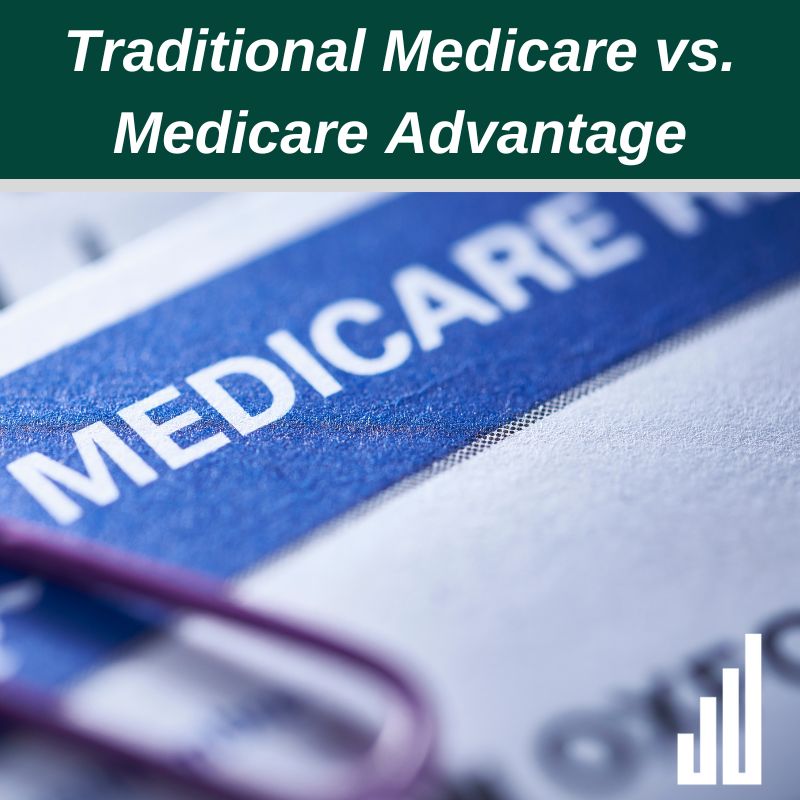Are you being bombarded with Medicare Advantage commercials or mailings? If it hasn’t started yet, I’m sure you’ll start receiving or noticing them soon. This is because we are now in the Open Enrollment period for Medicare Part D and Medicare Advantage plans.
Do these messages seem too good to be true? Are you wondering if you should consider a Medicare Advantage plan- for lower monthly premium costs or for the “extra benefits” you may receive? Alternatively, would it be better for you to stay on traditional Medicare?
Like most questions regarding health insurance… it depends. However, let’s discuss some of the key differences between Traditional Medicare and a Medicare Advantage plan that you may want to consider.
Premium Price-
One of the biggest marketing aspects of Medicare Advantage plans is the “pay as low as $0 a month”. However, what they typically don’t tell you up front is the fact that you still have to pay the Medicare Part B premium. In 2023 that premium is $164.90. Kindly note this could be higher if you will be required to pay the Income Related Monthly Adjustment Amount (IRMAA).
Also, know that there are Medicare Advantage plans that have a monthly premium for either “better” medical or drug plan coverages. Some plans may have a Part B reimbursement, meaning the insurance company may pay a part of the Medicare Part B premium on your behalf. Carefully consider this type of plan, as I would suspect the coverage amount may be different to make up for the higher costs to the insurance companies.
The cost of the Supplemental plans varies depending on which plan you purchase and from which insurance company. These are generally more expensive for a monthly premium but generally have lower out of pocket costs throughout the year.
Copays/Coinsurances for Covered Services-
Another difference between them is how payments for covered services work.
- If you have traditional Medicare with a supplemental plan, after you pay the Part B deductible, the supplemental plan will pick up some or all of the 20% coinsurance required by Medicare Part B or the deductible amount required for Medicare Part A.
- This is different if you have an Advantage plan. Most of the Advantage plans available have either a copay or coinsurance for each covered service (office visit, lab work, etc.) which may or may not be subjected to a deductible (dependent on the plan, refer to the plan documents).
Out of Pocket Max-
One thing you may want to consider, with hopes you never reach it, is the maximum you will have to pay out of pocket in a given year for Medicare covered services.
- If you just have Medicare with no supplemental plan- then your out-of-pocket costs are unlimited as there is no cap.
- If you have traditional Medicare with a supplemental plan- chances are your out-of-pocket costs for covered services are low, as it would depend on which supplemental plan you are enrolled in.
- For example, the Supplemental G Plan, the only out of pocket costs you have is the Medicare Part B deductible ($226 for 2023) for covered services. All other Medicare covered services are covered by the supplemental plan.
- If you have an Advantage plan, it could be over $10,000 dollars- as this also depends on which plan you have.
- Kindly note, this would only apply to Medicare Covered services. This does NOT include any drug costs, dental, vision, hearing or services not covered by Medicare.
Which Doctors are Covered? –
So, you have to go to a doctor or specialist, will it be a covered?
- A major plus of traditional Medicare with a supplemental plan is the coverage of doctors. As long as the doctor accepts Medicare, then you have coverage anywhere in the US. This also means that you do not need to obtain a referral to see specialists- as long as they accept Medicare, then you are able to see whom you want.
- If you have an Advantage Plan- you may be required to stay in a specific network (HMO or POS plan) or you may pay more for seeing an “out of network” doctor (PPO Plan). This may not be the best coverage for you if you like to travel or have seasonal homes
- Another thing to keep in mind- most Advantage plans have a “gate keeper” type headache- meaning your primary care doctor typically has to see you and make referrals before you can go see specialists.
What about Medications? –
Typically, when we are talking about medications, we are generally referring to those that would be covered under a Medicare Part D Plan.
- If you have traditional Medicare with a supplemental plan- there is no coverage on prescriptions unless you enroll in a Part D plan.
- These plans range in prices and coverage amounts. It is important to look at these plans annually during open enrollment as things can change drastically from one year to the next.
- If you have an Advantage plan- most include drug coverage. There are some that do not, so make sure you understand whether the plan you selected provides drug coverage or not.
What about Dental, Vision, Hearing?
As you can assume- Dental, Vision and Hearing benefits are not traditionally covered services of Medicare. There are a few exceptions, but for the mass population it is not a covered benefit.
- If you have traditional Medicare with a supplemental plan- you would self-insure or personally purchase Dental, Vision, or Hearing plans. This means you would have to either pay cash out-of-pocket for these services or purchase a standalone plan for these coverages.
- If you have an Advantage plan- most of the plans will have some sort of coverage for dental, vision, and hearing. Those coverages would likely be very limited- either by the amount that is covered or by the providers that you could see.
- For example- you may only have dental coverage for cleanings and x-rays at a specific dentist’s office. However, if you need a filling or crown, then you would likely be responsible for those costs.
I hope this helps clear up some of the confusion on the difference between Traditional Medicare with a supplemental plan and Medicare Advantage plans.
Do you have any additional questions? If so, we invite you to reach out to myself or the JGUA team!







